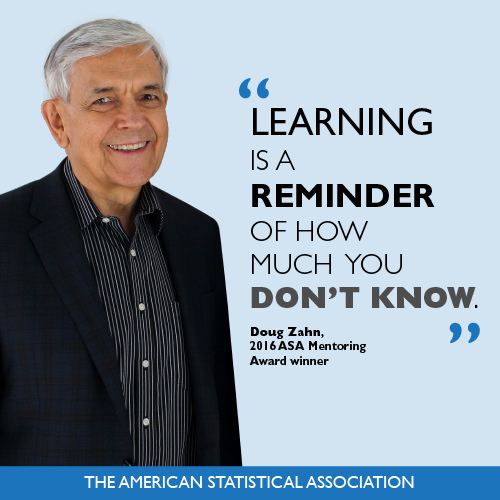 John O. Rawlings is professor emeritus, department of statistics, North Carolina State University. He earned his bachelor’s in technical science and his master’s in agronomy from the University of Nebraska. Additionally, he earned his PhD in both statistics and crop science from North Carolina State University, where he was professor of statistics until 1994. He is a Fellow of the American Statistical Association and the Crop Science Society of America.
John O. Rawlings is professor emeritus, department of statistics, North Carolina State University. He earned his bachelor’s in technical science and his master’s in agronomy from the University of Nebraska. Additionally, he earned his PhD in both statistics and crop science from North Carolina State University, where he was professor of statistics until 1994. He is a Fellow of the American Statistical Association and the Crop Science Society of America.
At the encouragement of 2010 ASA President Sastry Pantula, I am summarizing the comments I made at a commencement address in 1995 to the department of statistics at North Carolina State University (NCSU). I hope you find them as useful as he did.
Let me share with you some of the philosophies I learned from the founder of our department, Gertrude Cox, who was a visionary and had an appreciation for multidisciplinary research even before that term became fashionable. Statistics is in one sense a rather unique field. While all sciences are interlinked in that research in one field builds on knowledge from many fields, the actual research projects in many cases are fairly isolated and survive under their individual umbrellas. Chemists can study compounds in their corner of the world without regard to what others are doing. Plant taxonomists can classify plants without interacting with chemists. Soil scientists, while they need to understand the chemistry and physics of soils, need not collaborate closely with physicists and chemists to do good research.
Statistics, on the other hand, is unique in the degree to which the vitality of the science is dependent on close linkages with other sciences. Why is this? Statistics is essentially a set of tools—tools for research, data gathering, and interpretation. It is a somewhat sophisticated set of tools, but, nevertheless, a set of tools. And, it is impossible to build a better tool without thoroughly understanding the problem the tool is supposed to address. Statisticians must interact closely with researchers and practitioners in other fields, if we are to make our statistical tools relevant to the rest of society. Thus, the linkage with other sciences is essential to the life of statistical science.
Cox clearly saw the need for this close interaction when she formed this department. One of her conditions for coming here was that her department of statistics be required to provide statistical services to the College of Agriculture and Life Sciences. This close collaboration and the missionary work she and her faculty did to promote the use of statistics in the agricultural and life sciences were the key to building one of the strongest applied statistics programs in the world. Please note that what appeared to be a service provided by the statistics department for the rest of the college was, in reality, a major benefit to the department. In this sense, one can say that statistics as a science profits most by giving. We must make sure that philosophy continues.
I want to convey a couple of my basic tenants, which I feel are important to you and your future careers. I have couched these in terms of an opportunity, a warning, and an obligation.
Opportunity
Your degree in statistics has equipped you for a broad set of employment options. I can think of no other degree that opens so many doors for employment in so many areas of expertise. Every science, governmental agency, and industrial endeavor has many activities that could benefit from appropriate applications of statistical methods. This breadth of application of statistics is clearly an opportunity for you in your initial employment, but it is also an opportunity for you in your career advancement. The statistician in an organization has the opportunity to work with many departments and projects within that organization. Because of this, he/she is in one of the better positions for developing a broad understanding of the entire business. With proper preparation on your part, this provides long-term opportunities for promotion within the company. There have been many occasions in which the statistician moved on to become one of the executives, such as director of research, because of this. Be prepared to take advantage of these opportunities.
Warning
We have all heard the labeling for the three kinds of lies: lies, damn lies, and statistics. This labeling could have its origin from either of two places:
- To the “statistically disadvantaged,” who may not understand the workings of statistical methods, some of the results and conclusions from data analysis may appear somewhat magical and the conclusions do not agree with their preconceived ideas. It is easy to see in such cases why someone might think statistics is just a sophisticated way of lying.
- Alternatively, it could just as likely have come from the misuse or misapplication of statistical methods by dedicated individuals who simply did not completely understand the theory and methodology. I do not mean to make disparaging remarks about other scientists, but we often see this when scientists, based on introductory courses in statistics, attempt to serve as their own statisticians.
We, as trained statisticians, contribute to this impression of statistics as a perhaps sophisticated way of lying when we fail to understand the theory and methodology, or fail to keep abreast of new developments, and simply apply the techniques to which we have been exposed by cookbook methods.
My warning to you is two-fold:
-
Your education in statistics is not complete with you having obtained this degree. There will always be data that do not quite “fit” the recipe you might have learned or problems that do not ask the “standard” question. If you are going to be a successful statistician, you must always be “going to school”—learning new techniques, developing ways to answer new questions, etc.
Paradoxically, if you are a successful statistician, you may begin to feel discouraged and inadequate because you never seem to know everything you need to know to do your job properly. This is a good sign; just don’t let it get you down. You must be forever learning, or you will quickly become obsolete.
- Your integrity is essential for your success as a statistician. You will have access to the basic data, you will do editing of the data, you will be the one who extracts the essential information from the data, and you will often be the one who makes the fundamental conclusions. If management or your scientific peers ever have any reason to question your integrity, they will lose faith quickly in what you claim the data have to say. Therefore, it is essential that you carefully guard your objectivity and your integrity.
Even if your aim in “doctoring the data” was to satisfy management at one turn, management would then be aware of what you are willing to do and have every reason to question your results at the next turn. Your integrity is essential, even if it means speaking up to management and possibly losing your job. You must uphold the integrity of your profession, and, not incidentally, you must live with yourself.
Obligation
Finally, I would like to point out an obligation you have to yourself and your clients. As the statistician, you will be working with scientists, engineers, or individuals in other areas of expertise. The easiest method of operation (the lazy statistician’s way) is to sit back with the attitude that you know the statistics and it is the responsibility of the scientist (or your client) to come to you with the problem, interpret the scientific lingo so that you can understand what is being done, state for you the statistical question in which he is interested, and finally take the results of your statistical tests and go away.
The problem with this approach is that you become nothing but a “computing machine”—a technician. You really contribute nothing to the process that couldn’t be done with a good computer program. You are not only replaceable, but your position may soon be considered disposable. You never really become part of the research team. And, further, you bring no credit to the field of statistics.
One of the more common complaints from employers is that the statistician does not understand the science or the process. This was not as much of a problem in the earlier days of statistics because most trained statisticians were experts in some field before they became statisticians and then they went back to work in that original field. Such cases are rare these days. The dominant field from which statistics students come is mathematics, and many will have had only limited exposure to the science or engineering field in which they end up applying their statistical expertise.
Clearly, the newly trained statistician cannot be expected to be literate in all possible fields of application in which he might be employed, but there is an important attitude that can be imparted. It is the attitude that you are the missionary taking statistical methods to the field. It is the attitude that you will get to know and understand the science or the process and the lingo that goes with it. It is the attitude that you will go to the scientist and interpret the statistics for him/her, rather than expecting him/her to learn the statistics. It is this willingness to understand the science that will set you apart and eventually make you an indispensable member of the team, not just a technician. Your familiarity with the area of application will lead you to see new applications of statistics and new statistical methods that the scientist would not have imagined. It is this attitude that will make your statistical career exciting.
And so, in summary, your degrees open the doors for great opportunities. Make the most of them by keeping abreast of your field, protecting your integrity, and making yourself an indispensable member of the team.




Leave a Reply